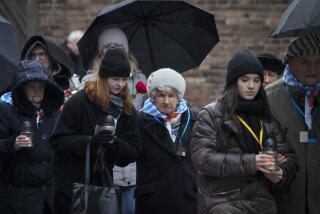GLENDALE : Armenian Genocide Is Commemorated
- Share via
When Aram Hovsepian came onstage Thursday night at the Glendale Central Library, even those in the audience who spoke no Armenian understood the emotion in the 84-year-old man’s voice as he recalled seeing his family killed at the hands of Turkish soldiers nearly 80 years ago.
“He still remembers everything,” said Hovsepian’s granddaughter Ani Boghigian, who emceed the event, a commemoration of the 80th anniversary of the Armenian Genocide.
About 100 people turned out to hear stories about the first genocide of the 20th Century, a historical event that remains unknown to many and is still not acknowledged by the government of Turkey.
“For the survivors of the genocide and their families, there has been no closure,” said Peter Musurlian, an aide to Rep. Carlos Moorhead and one of several local officials of Armenian descent who attended. “We are just asking for the recognition of the current government of Turkey, who is not responsible for what happened, that this occurred.”
More than 1.5 million Armenians are believed to have died between 1915 and 1923, when the Ottoman Turks deported Armenians living in Turkish-occupied western Armenia to the banks of the Euphrates River. The deportees were forced to walk hundreds of miles, and many died of dysentery and other illnesses along the way. Still others were raped, beaten and killed by the Turkish military.
A stunned silence fell on the room as Donald Miler, a USC professor of religious studies and an expert on the Armenian genocide, painted a picture of the massacre based on his years of study and interviews with survivors. Miler said those Armenians who survived the ordeal “scarcely appeared to be human” when it was through.
“Deportation may not have been as modern a technique as gas ovens, but it was equally effective,” he said, likening the genocide to the Jewish Holocaust.
Others also called the Armenian Genocide a precursor to later tragedies of the 20th Century including the blood baths in Cambodia and Rwanda. City Councilman Larry Zarian, who said his 85-year-old mother is a survivor of the genocide, called on the U. S. government and the United Nations to recognize the tragedy to help avoid another politically oriented mass murder.
“It is ironic that thousands of people throughout the world can tell the same story again and again, and still it falls on deaf ears,” Zarian said.
More to Read
Sign up for Essential California
The most important California stories and recommendations in your inbox every morning.
You may occasionally receive promotional content from the Los Angeles Times.













![Vista, California-Apri 2, 2025-Hours after undergoing dental surgery a 9-year-old girl was found unresponsive in her home, officials are investigating what caused her death. On March 18, Silvanna Moreno was placed under anesthesia for a dental surgery at Dreamtime Dentistry, a dental facility that "strive[s] to be the premier office for sedation dentistry in Vitsa, CA. (Google Maps)](https://ca-times.brightspotcdn.com/dims4/default/07a58b2/2147483647/strip/true/crop/2016x1344+29+0/resize/840x560!/quality/75/?url=https%3A%2F%2Fcalifornia-times-brightspot.s3.amazonaws.com%2F78%2Ffd%2F9bbf9b62489fa209f9c67df2e472%2Fla-me-dreamtime-dentist-01.jpg)